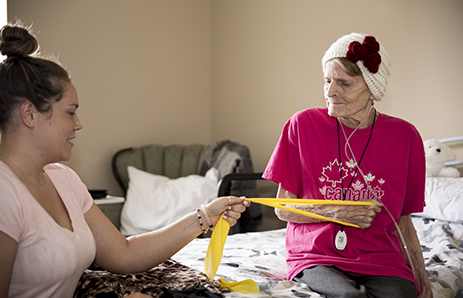Carriage House helps people regain health and quality of life
By the time 66-year-old Rose McMullen was admitted to Oshawa Hospital, she was so sick with severe pneumonia that she had lost nearly 40 pounds from her already slight 100-pound frame. Rose, who lives with muscular dystrophy and arthritis, had been mostly housebound for years and did not realize how ill she was.
After two weeks of medical treatment, Rose’s health improved to the point where she no longer needed 24-7 acute hospital care. However, after her in-patient stay, the thought of going home made her anxious.
While acute care hospitals are designed for people with urgent health concerns, illness or conditions and specialized medical needs, for people like Rose who no longer need immediate medical services, there are better options in the community.
Given her already complex health condition, Rose was able to be part of a new program she credits with helping her build the physical, social and emotional strength to live on her own again.
The Carriage House Reactivation Program is an innovative partnership between Lakeridge Health, Carriage House Retirement Residence, St. Elizabeth Health Care and the Central East Local Health Integration Network.
The program is enabling people to move safely and smoothly from hospital to the next level of care and, ultimately, to return to the community in better health and with greater peace of mind.
For some people, Carriage House provides a temporary bridge between the hospital and returning home. During her stay at the retirement home, Rose worked with a team of health care providers who supported her to recover her functioning and prepare for the future. With the assistance of a nurse practitioner from Lakeridge Health and a personal support worker, Rose was connected with a primary care physician of her own. She received daily strength and endurance training from a St. Elizabeth rehabilitation assistant and saw an occupational therapist and physiotherapist to assist her with walking and other daily activities. A social worker helped Rose with her housing needs and, together with the Central East LHIN and Community Care Durham, developed a plan to help Rose move to St. Catharines to be closer to her daughter.
Through the program, Rose was able to enjoy a better quality of life than she had experienced in a long time. She says that being part of the program enabled her to overcome some of her fears, like socializing with others. At Carriage House she joined a singing group, something she could not have imagined doing a month before she joined the program.
After 21 days at Carriage House, Rose was ready to go home.
Since the program was piloted last year, it has received overwhelmingly positive feedback from the 29 residents and families who have utilized this unique care option.
The program is also helping to improve the health care system for everyone in the community.
By assisting people like Rose to get supports and services in new and innovative ways, the reactivation program helps to ensure hospital beds are available for those people who have health issues which are best treated in an acute care hospital.
Photo above: Rose McMullen (right) and her health care provider.
